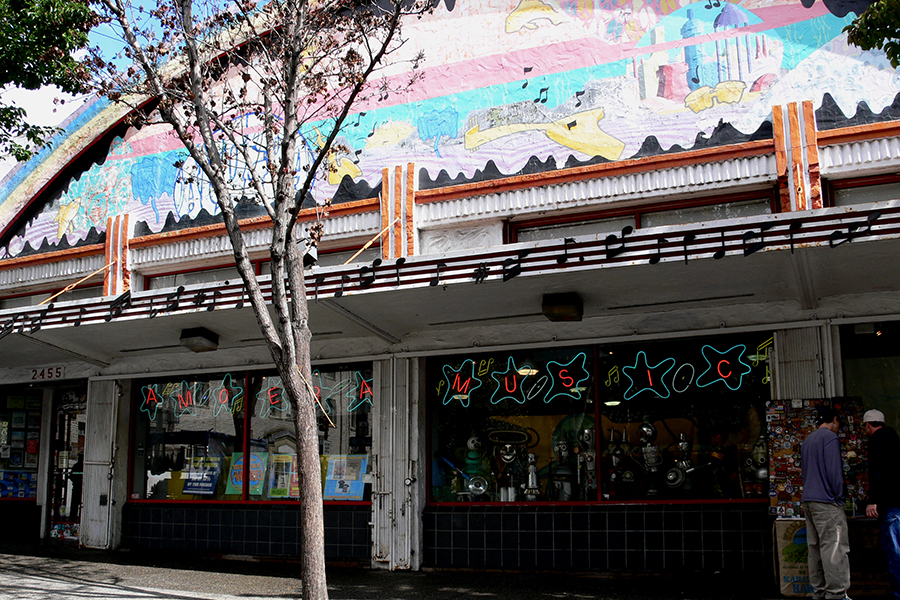INTERVIEW: Amoeba Founder Marc Weinstein on the future of the business amid coronavirus crisis

Amoeba Music Berkeley in October 2008. Courtesy: Andreas Praefcke.
In less than 48 hours, Amoeba Music has raised more than one-fourth of its $400,000 fundraising goal.
Cofounder Marc Weinstein started a GoFundMe campaign for the company’s flagship Berkeley store, as well as San Francisco and Los Angeles locations on Monday, announcing that Amoeba was in financial trouble due to to forced closures stemming from the coronavirus crisis. Contributions will go to keeping the stores in business and helping employees.
The goal, he told RIFF Tuesday evening, wasn’t a cure-all.
“It’s equivalent to not much more than one month’s rent for all three stores,” Weinstein said. “It’s enough that it could seriously help us for a month or two. We had to pick a number. Our needs are greater than $400,000.”
Weinstein said he’d never considered crowdfunding before—not even in 2008, when, during the recession, he was forced to sell the Amoeba Hollywood property and become a tenant instead. But the shelter-in-place orders due to the novel coronavirus have been a significantly more challenging time for Amoeba Music, and he decided he had nothing to lose. He looked to the example of San Francisco’s historic City Lights Bookstore, which was saved last week through a crowdfunding campaign.
“This is a chance to get some help from all of our customers who obviously love what we do, as is evidenced by all the great comments,” Weinstein said. “Looking at all those comments has been very uplifting [and served] as a reminder of what we mean to people and the community.”
Amoeba is well known for attracting music superstars and Hollywood royalty, and Weinstein said he hopes some of them can also help out, though the stores don’t have a direct line to those customers. Still, he hopes that if enough people share the GoFundMe campaign, they will eventually find out and that he would be very appreciative of the help. He said he noticed how Taylor Swift helped her local record shop in Nashville following the recent tornado that leveled parts of downtown.
“I would think there are people in L.A. or the Bay Area who might similarly notice that we are threatened here. It would be good for us and it could be good for them to be that person who helps,” he said.
The company closed all three of its stores in mid-March and has continued online sales, but that hasn’t been nearly enough to pay its 400 employees.
Amoeba has applied for federal and local grants. Even then, they wouldn’t be enough. Weinstein said he believes he will eventually receive some assistance from small business loans, but how much and when is up in the air and he had yet to hear as of Tuesday. How long the stores can continue to stay in business while shuttered depends on variables—none bigger than how long the lockdown will continue. But he’s not thinking about going out of business.
“I think the Bay Area stores are the easiest to … open back up,” he said. “We think we have the means to keep those stores going, unless this thing goes on for six months. The L.A. store is the challenge for us. It’s a much bigger store.”
Weinstein opened the Berkeley location, on Telegraph Avenue, in 1990. It was followed by popular San Francisco store in Haight Ashbury in 1997 and in Hollywood in 2001. The company is planning on moving to a new L.A. location four blocks away in October and some of the money fundraised may be used to support that move. But the longer the lockdown goes on, the less chance that the current location, on Sunset Boulevard, will reopen again.
“We’re dead-set on moving. No matter what, Amoeba L.A. is staying open,” he said. “We might even be able to open that location earlier if we’re able to negotiate our way out of our current space. … We’re 100 percent focused on getting the new store open. That’s out main goal.”
Weinstein said the culture Amoeba Music has cultivated is important to the music industry; from artists to labels and distributors in addition to the very devoted customers. A drummer himself, he said he understands where artists are coming from, so the store makes an effort to help newer, up-and-coming acts as well.
“We think we’re pretty integral to keeping [the industry] healthy. We provide a service that’s really important.”
Follow editor Roman Gokhman at Twitter.com/RomiTheWriter.
